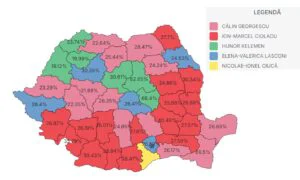Semnal de alarmă din partea agențiilor de rating. Guvernul nu trebuie să arunce în aer miliardele de euro obținute prin PNRR
- Sabina Popescu
- 14 septembrie 2021, 16:28
 România, sprijinită de Comisia Europeană și Banca Mondială pentru implementarea reformelor, inclusiv cele din PNRR. Sursa foto: arhivă EvZ
România, sprijinită de Comisia Europeană și Banca Mondială pentru implementarea reformelor, inclusiv cele din PNRR. Sursa foto: arhivă EvZ O agenție de rating a comentat ultimele evenimente politice din România și transmite, în cadrul unui comentariu, că este puțin probabil ca acțiunile de pe scena politică să stopeze consolidarea fiscală începută deja, însă se așteaptă ca Guvernul Florin Cîțu să asigure finanțarea europeană prin intermediul PNRR.
Agenția de rating Standard & Poor’s (S&P) transmite că nu preconizează „riscuri iminente” la adresa planurilor pe termen scurt ale Guvernului de reducere a deficitului bugetar, în contextul ofensivelor îndreptate pe scena politică împotriva oficialilor. S&P arată că scandalul politic s-a declanșat în momentul în care Guvernul trebuie să asigure obținerea fondurilor europene din partea Comisiei prin intermediul PNRR.
Estimările agențiilor de rating sunt importante pentru investitorii de pe piețele financiare care investesc în datoria publică a țării.
Guvernul trebuie să asigure finanțarea europeană prin PNRR
„Așteptările noastre, în scenariul de bază, sunt ca guvernul să încerce păstrarea capacității de funcționare pe termen scurt pentru a atrage finanțarea europeană. Adoptarea rectificării bugetare de săptămâna trecută indică faptul că executivul are capacitatea de a-și duce la îndeplinire politicile. Cu toate acestea, incertitudinea persistentă ar putea accentua riscurile fiscale pe termen mediu”, arată comentariul S&P.
Creșterea economică ajută Guvernul Cîțu să gestioneze presiunea pe politica fiscală, potrivit agenției de rating citate, care arată că expansiunea PIB de 6,5% în primul semestru a fost mai mare față de estimarea agenției, de 5%, notează economedia.
Comentariul S&P integral
Romania Political Events Unlikely To Stop Consolidation
S&P Global Ratings said today that it does not expect imminent risks to Romania’s (BBB-/Stable/A-3) near-term fiscal consolidation plans following the resignation on Sept. 7, of USR Plus ministers from the government coalition. USR Plus’ withdrawal, following a series of policy clashes and intra-coalition tensions, will require Prime Minister Florin Citu to seek parliamentary reapproval for his now minority cabinet within 45 days. This comes at a time when the government is set to engage with the European authorities to secure funds from the EU’s Recovery and Resilience Facility.
We assume, in our base case, that the government would aim to preserve its capacity to function over the short term in order to contract this funding, which we understand is ready to be disbursed. The adoption of Romania’s budget rectification for 2021 last week suggests that there is capacity to execute policy, in our view. That said, persistent uncertainty could accentuate fiscal risks over the medium term.
Separately, the USR Plus party filed a motion to censure Citu’s government but we understand the debate and vote have been delayed. This is the second time that confidence in the government has been questioned in just four months.
Aside from the ongoing votes of confidence, both parties will hold elections of their leadership over the coming month. This could spur a political re-set of coalition talks, somewhat complicating the political outlook.
For now, Romania’s rebounding economic growth is helping to mitigate pressure on the government’s fiscal position. The economy has already returned to its prepandemic output, expanding by 6.5% over the first half of 2021, outperforming our April forecast of 5% growth for the full year (see “Romania Outlook Revised To Stable From Negative On Decreasing Fiscal Risks; ‘BBB-/A-3’ Ratings Affirmed,” published April 16, 2021).
We forecast GDP growth at about 4.5% in 2022 and 2023, buoyed by EU and Next Generation EU grants and loans totaling 20% of Romania’s GDP between 2021 and 2026. Our current forecasts include a general government deficit of 7% of GDP in 2021, before gradually narrowing to 3% of GDP in 2024 supported by the government’s consolidation agenda and Romania’s recovering economy.
Nevertheless, should the political deadlock persist, it could disrupt progress on much-needed fiscal reform. We still believe that medium-term fiscal consolidation and a rebalancing of Romania’s budget structure, aided by successful absorption of EU financing, are key elements to stabilizing the country’s fiscal and external positions.
The next scheduled review of our ratings on Romania is on Oct. 15, 2021.








